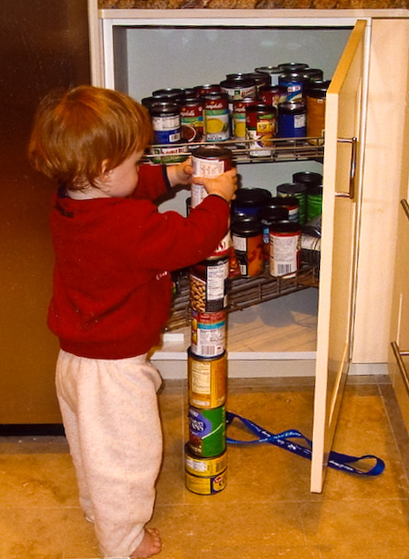
Obsessive stacking or lining up toys is common behavior for toddlers in the autism spectrum, though it’s not uncommon for neurotypical toddlers to do it, too.
Autism is a neural developmental disorder that affects how the brain processes information. It’s one of three disorders in the autism spectrum, which also includes Asperger syndrome and Pervasive Developmental Disorder. (We’ll refer to these three disorders as ASDs, for Autism Spectrum Disorders, to keep it simple). Unlike, say, a missing toe, ASDs aren’t simply and easily diagnosed from a single, obvious symptom. Instead, a diagnosis is based on a series of criteria: impairments in social interaction, impairments in communication, and restricted interests and repetitive behavior.
What’s most crazy-making to worry-prone new and expectant parents is that the behaviors include things that most typical-brained babies and toddlers will do at some time or another: making little eye contact and not responding to their name, making repetitive movements, self-injury like head-banging or hand-biting, and ritualistic behavior such as strongly preferring a strict schedule and the same foods every day, to name a few. Research has also found that children with ASDs are four times more likely to have gastrointestinal issues.
The difference is with babies with ASDs is that it’s not just one or two symptoms from time to time, but most of the symptoms, all of the time:
- Not mirroring your facial expressions, such as smiling when you smile or sticking out a tongue when you do,
- Avoiding eye contact
- Not tracking objects with the eyes (try moving a squeaky toy in a circle in front of baby, most babies will follow it with their eyes)
- Not smiling by 6 months, or babbling, or showing interest in toys.
- Regressing developmentally.
Diagnosis of ASDs have increased tremendously since the 1980s, but no one is sure if this means the disorder is actually becoming more common, or if it’s just being diagnosed at a higher rate than it used to be.
So what do we know about the causes of ASDs?
Genetics. A child with a sibling with an ASD is 25 times more likely to have one also. It doesn’t appear to be one single gene, but multiple genes, and possibly multiple genes interacting and being altered by certain specific environmental factors, a phenomenon known as epigenetics.
Iron deficiency during pregnancy. Low iron intake has been associated with an increased risk, especially in older mothers.
A folate deficiency. A study has found that taking a folic acid supplement reduces the risk of an ASD by 40 percent.
Older parents. Having a parent 40 or older doubles the risk of having a baby with an ASD. Even with a mother under the age of 30, having a father older than 40 doubles the risk, as compared to fathers 29 and younger.
Illness during pregnancy. Research has found apparent links between ASDs and immune disorders and specific antibodies during pregnancy.
Phthalates and BPA. A Swedish study found that boys with vinyl flooring in their homes were twice as likely to be diagnosed. BPA (bisphenol A) has also been linked.
Air pollution. A study found that exposure to heavy pollution raises the risk by 12-15 percent.
Things that were thought to be causes at one time, but were later found not to be associated:
Vaccines. A paper published in 1998 reported to have found a link between autism and vaccines. Since then the paper was revealed as a fraud and retracted and the link between autism and vaccines has been disproven many, many times. Still, there are people who continue to insist there is a link. There is not.
Maternal smoking. Smoking while pregnant can cause all sorts of health issues during pregnancy and have life-long effects on the baby, but an ASD has been ruled out as one of those effects.
Lyme disease. This was another theory that had been floated and debunked.
Antidepressant use. A study of 600,000 Danish children found no link between the use of antidepressants and autism.
While there is no cure for ASDs, early intervention has been shown to make a huge difference in overcoming the developmental delays associated with the disorder. If you find that your baby is not meeting basic developmental milestones, don’t wait until your next well-baby visit; call your pediatrician right away.








Leave a Reply